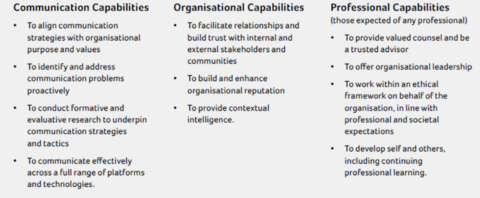- blog
- CCO
The soon-to-be released Page research on the role of the Chief Communication Officer (CCO) talks about at an inflection point for business. Everything is being turned on its head by technology, globalisation, demographic shifts and significant transformation in how enterprises operate and what value they create in the world.
There are huge opportunities for engagement with individuals and communities, but there are equally dangerous threats to the integrity of public discourse and trust. Fake news is just one aspect of this. This requires a deep re-think of the role of senior communicators.
The Page research identified four key factors that demand that CCOs step up to the challenge and thereby begin to release the potential of the communication function. The first three factors can be grouped under the heading of developing corporate character.
Brand is about identifying, embedding and activating the differentiated identity of the organisation – its DNA if you like. In Page’s view, brand is the totality of how the enterprise is experienced by all stakeholders through every touchpoint. Culture is about the inside of the organisation - everything the company is, how it behaves, what its values are and, importantly, how it works – including its tools, management systems, work environments, means of collaboration and decision-making – everything that defines how employees work. Societal Value is about how the organisation aligns and contributes to the social good, thereby ensuring society gives it permission to survive and thrive.
Running parallel to these three elements of corporate character is technical communication proficiency – CommTech for short. This is about optimising all content and channels across to engage stakeholders and build trust.
These four factors demand huge levels of professional expertise. This is where the new Global Capability Framework (GCF) takes centre stage. Developed by a group of researchers across seven continents and working with professional associations who are members of the Global Alliance (1), the GCF has identified the capabilities of the profession when it performs at its best. It is more about potential than current performance and it resonates very well with the framework that the Page research describes.
In summary, the GCF delineates the scope and depth of the profession globally in as few descriptive statements (capabilities) as possible. It differs from the more traditional competence frameworks with their lists of skills, knowledge and attributes, because context often determines how and if these can be acquired and practiced. Broader descriptions of the potential of the profession allow flexibility for regional and cultural variations and interpretations and is entirely appropriate in a global context. There are 11 capabilities in the GCF, each of which has a small number of sub-capabilities providing a fuller description.
The full GCF can be found at hud.ac/ect, but the main headings are given below. They are divided into three categories – first, what might be called the operational capabilities required of any professional communicator. Several of these can be directly linked to CommTech, but there are others. Second, capabilities that make a direct contribution to the organisation, and again there are several here that relate to corporate character. Third, the professional capabilities, and most of these refer to what the essence of being a professional means. This includes an obligation to society and to constant personal and professional improvement.

To give an example of how the sub-capabilities ‘unpack’ these main headings, the third professional capability is expanded like this:

Page and the capabilities research team have realised there is much to be gained by working collaboratively on developing the role of the communication community, especially in helping CCOs to prepare their teams for the future. A first collaboration was to produce two webinars, one focused on Asian and global capabilities and the other on US and global capabilities. You can view the webinars below.
I co-led the U.S.-focused webinar with Dr. Katerina Tstetsura:
I co-led the global-focused webinar with Dr. Gregor Halff:
There is more to come: watch this space!
Authors:
All the authors of this blog are members of Page.
1 The Global Alliance is the confederation of professional associations in public relations and communication management worldwide. Combined membership is almost 300,000 professionals.